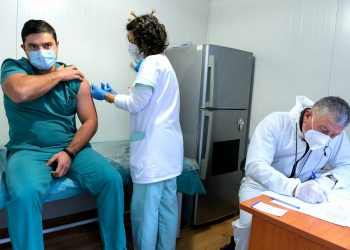Can technology help us to fight the coronavirus pandemic? EU Members States, supported by the Commission, have developed an EU toolbox. These are software mobile applications for contact tracing and warning in response to the coronavirus pandemic. Do you believe a European App could be a common coordinated approach to support the gradual lifting of confinement measures? How can we use technology to fight the coronavirus?
Contact tracing and warning can play an important role in all phases of the outbreak especially as part of containment measures during de-escalation scenarios. Its impact can be boosted by a strategy supporting wider testing of persons showing mild symptoms. Since the outbreak of the coronavirus pandemic, Member States, backed by the Commission, have been assessing the effectiveness, security, privacy, and data protection aspects of digital solutions to address the crisis.
Can technology help us to fight the Coronavirus pandemic?
Contact tracing apps
Contact tracing apps, if fully compliant with EU rules and well coordinated, can play a key role in all phases of crisis management, especially when time will be ripe to gradually lift social distancing measures. They can complement existing manual contact tracing and help interrupt the transmission chain of the virus.The toolbox is accompanied by guidance on data protection for such mobile apps, which is also published.
EU toolbox – Coronavirus Tracking
What’s happening in Europe?
The toolbox reflects the latest best practices in the use of mobile contact tracing and warning apps to tackling the crisis. It is part of an ongoing process where Member States work together to devise and refine in the coming weeks and months the use of this and other practical tools. This first version will be further enriched in light of the experiences of Member States.
Digital tools such as mobile apps with tracing functionalities can be of substantial support in this process, identifying both known and unknown contacts of a confirmed case and possibly help in their follow up, in particular in settings with large numbers of cases where public health authorities can get overwhelmed. Such functionalities can help identify more contacts and speed up the overall process substantially, which is of essence in this pandemic. The functionality in such apps, if rolled out on a large scale so that they reach well over 50% of the population, could be useful for Member States to rapidly detect contacts of cases, collect information on these contacts and to inform contacts on the need for follow-up and testing if required. In addition, the apps can provide contacts of COVID-19 cases with the information on how to reduce the risk of further transmission and advice on what to do if they develop symptoms.
Coronavirus Tracking Apps
By 30 April 2020, public health authorities will assess the effectiveness of the apps at national and cross-border level. Member States should report on their actions by 31 May 2020 and make the measures accessible to other Member States and the Commission for peer review. The Commission will assess the progress made and publish periodic reports starting in June 2020 and throughout the crisis, recommending action or the phasing out of measures that seem no longer necessary.

Welcoming the toolbox, Commissioner for Internal Market Thierry Breton said: “Contact tracing apps to limit the spread of coronavirus can be useful, especially as part of Member States’ exit strategies. However, strong privacy safeguards are a pre-requisite for the uptake of these apps, and therefore their usefulness.”
While we should be innovative and make the best use of technology in fighting the pandemic, we will not compromise on our values and privacy requirements.
Thierry Breton, EU Commissioner for Internal Market
Commissioner for Health and Food Safety, Stella Kyriakides added: “Digital tools will be crucial to protect our citizens as we gradually lift confinement measures. Mobile apps can warn us of infection risks and support health authorities with contact tracing, which is essential to break transmission chains. We need to be diligent, creative, and flexible in our approaches to opening up our societies again. We need to continue to flatten the curve – and keep it down.”

Without safe and compliant digital technologies, our approach will not be efficient.
Stella Kyriakides, EU Commissioner for Health and Food Safety
e-Health Network
A common approach for voluntary and privacy-compliant tracing apps
This EU Commission’s announcement is the first iteration of a common EU toolbox, developed urgently and collaboratively by the e-Health Network with the support of the European Commission. It provides a practical guide for Member States in the implementation of contact tracing and warning apps. The toolbox sets out the essential requirements for these apps:
- They should be fully compliant with the EU data protection and privacy rules, as put forward by the guidance presented, following consultation with the European Data Protection Board.
- They should be implemented in close coordination with, and approved by, public health authorities.
- They should be installed voluntarily, and dismantled as soon as no longer needed.
- They should aim to exploit the latest privacy-enhancing technological solutions. Likely to be based on Bluetooth proximity technology, they do not enable Coronavirus tracking of people’s locations.
- They should be based on anonymised data: They can alert people who have been in proximity for a certain duration to an infected person to get tested or self-isolate, without revealing the identity of the people infected.
- They should be interoperable across the EU so that citizens are protected even when they cross borders.
- They should be anchored in accepted epidemiological guidance, and reflect best practice on cybersecurity, and accessibility.
- They should be secure and effective.
- While allowing for easier, quicker and more efficient tracing than traditional systems based on interviews with infected patients, manual tracing will continue to cover citizens who could be more vulnerable to infection but are less likely to have a smartphone, such as elderly or disabled persons.
A common approach to other functionalities, in particular on information and symptom Coronavirus tracking, may be developed in future iterations of the toolbox.
WHO for Coronavirus Tracking
The World Health Organisation (WHO) has declared the COVID-19 to be a pandemic. Mobile applications (‘apps’) can support health authorities at national and EU level in monitoring and mitigating the ongoing COVID-19 pandemic, facilitate the organisation of medical follow-up of patients and provide direct guidance to citizens on playing their part in the control of the disease.
In a number of countries, both within the EU and worldwide, national authorities or developers have announced the launch of apps offering varying levels of functionality to support the fight against the virus. Member States recognise the value of such apps needs to be considered within the context of wider public health measures and the stage of the spread of the contagion. Apps that support contact tracing in particular have emerged as the most promising, from a public health perspective.
These apps offer the possibility of alerting/ warning citizens that they have been in close proximity with an individual who has been confirmed positive for Covid-19. (For the purposes of this toolbox ‘contact tracing and warning apps’ refers to apps with such a functionality).
Cybersecurity of Coronavirus Tracking
The NIS Cooperation Group, within its work stream on Cybersecurity in the health sector, will facilitate the exchange of good practices for national authorities dealing with cybersecurity of COVID applications including identifying effective testing and evaluation methods in cooperation with the European Cybersecurity Certification Group established by the Cybersecurity Act. The CSIRTs network will continue to provide relevant EU wide situational awareness and information sharing on related threats, incidents and vulnerabilities.
Member States with the Commission will seek clarifications on the solution proposed by Google and Apple with regard to contact tracing functionality on Android and iOS in order to ensure that their initiative is compatible with the EU common approach.
Member States are collectively determined to return to normal life without harming our fundamental rights and freedoms. They are seeking to converge in their use of digital health tools that have a significant and growing role to play in fighting the pandemic. Implementing this common approach across the EU to the use of mobile tracing and warning apps is an important first step forwards.
De-escalation scenarios
Contact tracing and warning can play an important role in all phases of the outbreak especially as part of containment measures during de-escalation scenarios. Its impact can be boosted by a strategy supporting wider testing of persons showing mild symptoms.














